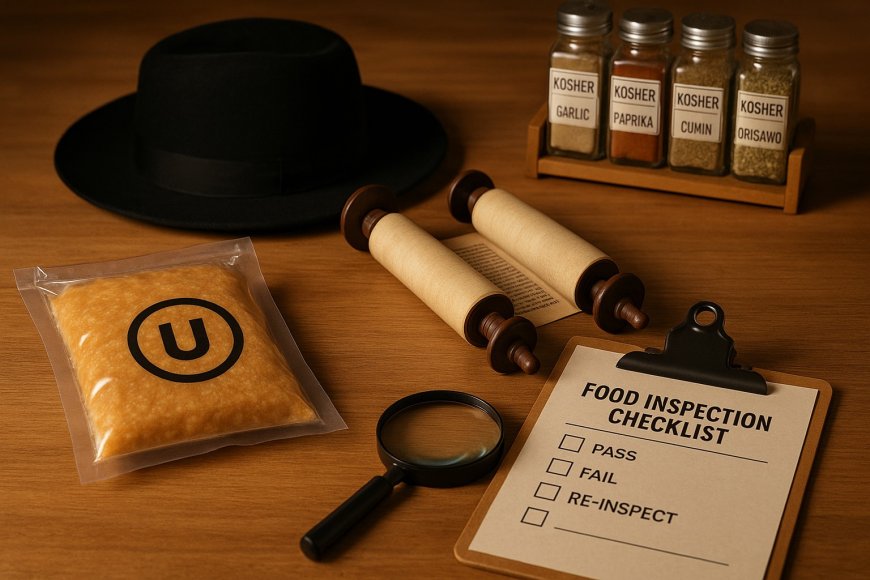Tapping Into the Growing Demand for Kosher Products

You know what? Sometimes, the smallest decisions can open the biggest doors. For food manufacturers, getting kosher certification might just be one of those decisions. It’s not just about catering to a niche market—it’s about expanding your reach, building trust, and maybe even streamlining your production process in ways you hadn’t considered. If you’re producing packaged foods, snacks, beverages, or ingredients, kosher certification could be the key to tapping into a loyal consumer base while boosting your brand’s credibility. Let’s break it down and explore why this matters, how it works, and what it means for your business.
What Does Kosher Even Mean?
At its core, kosher is about food that aligns with Jewish dietary laws, rooted in centuries-old traditions from the Torah. But don’t worry—you don’t need to be a scholar to get the gist. Kosher foods follow specific rules about what’s allowed (think certain meats, no mixing of dairy and meat) and how they’re prepared. For food manufacturers, this means ensuring your ingredients, processes, and equipment meet these standards. Sounds like a lot, right? But here’s the thing: it’s less about overhauling your entire operation and more about making smart, strategic adjustments.
Why does this matter to you? Well, kosher-observant consumers—estimated to be over 15 million in the U.S. alone—are a dedicated bunch. They actively seek out products with that little kosher symbol on the package, whether it’s a “K,” “OU,” or another recognizable mark. And it’s not just Jewish consumers. Many non-Jewish folks, from vegans to health-conscious eaters, gravitate toward kosher products because they associate them with quality and cleanliness. That’s a market you can’t afford to ignore.
The Business Case: Why Go Kosher?
Let’s talk numbers for a second. The global kosher food market is projected to hit $25 billion by 2027, growing at a steady clip. That’s not just matzo and gefilte fish—it’s snacks, beverages, sauces, you name it. For food manufacturers, kosher certification isn’t just a feel-good move; it’s a business strategy. Here’s why:
· Wider Market Reach: Kosher certification opens doors to Jewish consumers, but also to Muslims (many kosher products align with halal standards), vegetarians, and others who see kosher as a mark of quality.
· Brand Trust: That kosher symbol on your packaging? It’s like a badge of honor. It tells consumers your product has been vetted by a third party for quality and compliance.
· Retail Opportunities: Major retailers like Walmart, Costco, and Whole Foods often prioritize kosher-certified products to meet consumer demand. Want to get your snacks on their shelves? Kosher certification might just tip the scales.
But here’s a little digression—because, honestly, who doesn’t love a good tangent? I was at a grocery store the other day, scanning the aisles for a quick snack, and I noticed how many products had that tiny “OU” symbol. From chips to soda to frozen pizza, it was everywhere. It got me thinking: kosher isn’t just a niche anymore—it’s mainstream. And for manufacturers, that’s a golden opportunity.
How Does the Process Actually Work?
Okay, let’s get into the nuts and bolts. Getting kosher certification starts with reaching out to a certifying agency—think organizations like the Orthodox Union , OK Kosher, or Star-K. These groups have rabbis and inspectors who know the ins and outs of kosher law and will work with you to ensure your products comply. Here’s a quick rundown of what to expect:
· Application: You’ll submit details about your ingredients, suppliers, and production processes. Be ready to share everything—transparency is key.
· Inspection: A rabbi or inspector visits your facility to check your equipment, storage, and production lines. They’re looking for things like cross-contamination risks (say, dairy residue on a line used for non-dairy products).
· Ingredient Review: Every ingredient, down to the smallest additive, gets scrutinized. If your supplier’s emulsifier isn’t kosher, you’ll need to find an alternative.
· Ongoing Supervision: Depending on your product, you might need periodic check-ins to maintain certification. Some products, like dairy or meat, require more oversight than, say, a bag of potato chips.
Sounds intense, doesn’t it? But here’s the flip side: most manufacturers find the process surprisingly manageable. Agencies work with you to make it feasible, often suggesting small tweaks rather than a complete overhaul. For example, one snack company I read about switched to a kosher-certified oil supplier and was good to go—no major disruptions. It’s less about jumping through hoops and more about building a partnership with the certifying agency.
A Quick Word on Equipment
Here’s something that trips people up: your equipment needs to be “kosherized.” That might mean a deep clean or even a special process (like boiling water through your machinery) to ensure no non-kosher residue lingers. Think of it like giving your production line a spa day. It’s a one-time effort that sets you up for success, and most agencies guide you through it step by step.
The Hidden Benefits You Didn’t Expect
Sure, the market expansion is great, but kosher certification can do more than just boost sales. Ever thought about how it might streamline your operations? When you go kosher, you’re forced to take a hard look at your supply chain—every ingredient, every supplier. That kind of scrutiny often uncovers inefficiencies you didn’t know existed. Maybe you find a better supplier or realize you can consolidate your ingredient list. It’s like spring cleaning for your business.
Plus, there’s a ripple effect. Kosher certification can make your brand more appealing to international markets, especially in places like Israel or Europe, where kosher demand is strong. And let’s not forget the PR angle—consumers love brands that cater to diverse needs. It’s a chance to tell a story about inclusivity and quality, whether you’re pitching to retailers or posting on social media.
A Little Story from the Trenches
I heard about a small beverage company that decided to go kosher to break into a new market. They were nervous—thought it’d be a logistical nightmare. But after working with a certifying agency, they realized it was mostly about swapping a few ingredients and scheduling regular inspections. Within a year, their sales jumped 20% because they landed a contract with a major grocery chain. That’s the kind of win that makes you rethink what’s possible.
How to Tackle Them
Let’s be real—nothing worth doing is ever completely smooth sailing. Kosher certification comes with a few hurdles, but they’re not insurmountable. Here are the big ones:
· Cost: Certification isn’t free. You’ll pay for inspections, annual fees, and possibly equipment upgrades. But think of it as an investment. The return—access to a growing market—often outweighs the upfront costs.
· Time: The process can take a few weeks to a few months, depending on your setup. Plan ahead, especially if you’re aiming for a specific launch date.
· Learning Curve: If you’re new to kosher, the rules can feel overwhelming. Lean on your certifying agency—they’re there to help you navigate.
Here’s a pro tip: start small. If you’ve got a huge product line, don’t try to certify everything at once. Pick a few high-potential products, like your best-selling snack or beverage, and test the waters. You can always scale up later.
Why Now’s the Time to Jump In
If you’re still on the fence, consider this: consumer demand for transparency and quality is at an all-time high. People want to know what’s in their food, how it’s made, and whether it aligns with their values. Kosher certification checks those boxes. It’s a signal to consumers that you’re serious about quality, and it’s a way to stand out in a crowded market.
Plus, with trends like clean eating and ethical consumption on the rise, kosher fits right in. It’s not just about religious observance anymore—it’s about appealing to a broader audience that values trust and tradition. And with Passover and other Jewish holidays driving seasonal spikes in demand, there’s no better time to get started.
A Final Thought
You know what’s funny? Sometimes the things that seem like a stretch—like jumping through the hoops of kosher certification—end up being the very things that set your brand apart. It’s not just about slapping a symbol on your packaging. It’s about building trust, reaching new customers, and maybe even discovering a better way to run your business. So, why not take a chance? Reach out to a certifying agency, ask some questions, and see where it takes you. Your next big market might be waiting.
What's Your Reaction?
 Like
0
Like
0
 Dislike
0
Dislike
0
 Love
0
Love
0
 Funny
0
Funny
0
 Angry
0
Angry
0
 Sad
0
Sad
0
 Wow
0
Wow
0






























